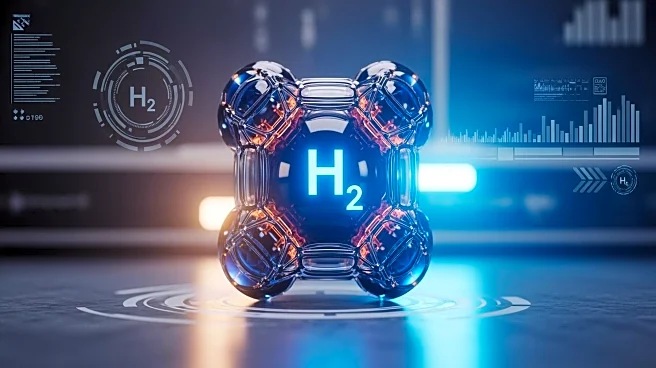What's Happening?
Mitsubishi Fuso Truck and Bus Corporation (MFTBC) has introduced two innovative hydrogen-powered heavy-duty truck concepts at the Japan Mobility Show 2025. The H2IC model utilizes an internal combustion
engine that combusts compressed hydrogen gas, while the H2FC model employs a fuel cell system that converts hydrogen into electricity to power an electric motor. These trucks are designed to facilitate a faster transition to hydrogen vehicles, particularly in high-power applications such as construction vehicles. The H2FC model features a liquid hydrogen tank with a driving range of up to 1,200 kilometers and can be refueled in just 15 minutes. This technology, jointly developed by Daimler Truck and Linde Engineering, simplifies the equipment required at hydrogen stations, potentially reducing infrastructure costs.
Why It's Important?
The introduction of these hydrogen-powered truck concepts marks a significant step towards achieving carbon neutrality in commercial vehicles, especially those involved in heavy-duty transport and long-distance haulage. Hydrogen fuel offers high energy content, long range, and short refueling times, making it a viable alternative to fossil fuels. The advancements in liquid hydrogen technology could lead to reduced infrastructure costs and increased adoption of hydrogen vehicles. This development aligns with global efforts to transition to cleaner energy sources and reduce carbon emissions, impacting industries reliant on heavy-duty transportation.
What's Next?
MFTBC is collaborating with Iwatani Corporation to establish subcooled liquid hydrogen technology in Japan, with discussions underway for ISO standardization. The company is also building partnerships with external entities to support the implementation of this technology. As hydrogen infrastructure develops, these truck concepts could pave the way for broader adoption of hydrogen vehicles, influencing regulatory frameworks and commercial strategies in the transportation sector.
Beyond the Headlines
The deployment of hydrogen-powered trucks could trigger long-term shifts in the automotive industry, encouraging innovation in fuel technologies and infrastructure development. Ethical considerations around environmental impact and sustainability are likely to drive further research and investment in hydrogen solutions, potentially reshaping the future of mobility.









